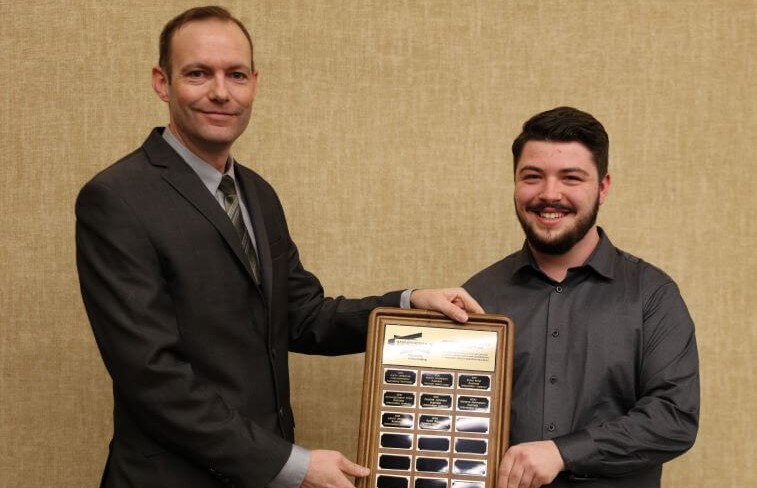
Ryan Squire has just completed his three-year Engineering Design and Drafting Technology diploma diploma at Saskatchewan Polytechnic’s Moose Jaw campus and has been named Co-operative Education Student of the Year. “I was surprised but really pleased to win,” he says, noting that there were other students he thought were more likely candidates based on their work. The award recognizes academic achievement, but it also acknowledges those who go above expectations in their commitment to learning through the co-operative education model.

Squire came to Sask Polytech after starting a university engineering degree and realizing that it wasn’t the right fit. Having grown up in Balgonie, just east of Regina, the high school graduate found the transition to unstructured learning at university challenging, and ultimately decided his mental health was suffering enough to warrant a change. He remembers sitting in his dorm room and researching options for what to do next on his computer.
Squire had been interested in drafting and computer aided design work since high school, where he’d become familiar with computer assisted design (CAD) software. “I had taken every class possible in this subject in high school with the goal of becoming an engineer with a background in CAD,” explains Squire. “A friend I went to high school with had entered the Engineering Design and Drafting Technology program at Sask Polytech and spoke highly of it. I decided after my experience at university that engineering drafting and design technology was the CAD-focused route that I had been looking for.”
His prior learning in CAD meant that the first year of his new program was a review of skills and software he had been using for a few years. “My classmates and I were a bit of an odd bunch,” he says, “with vastly different backgrounds—but we each brought our own skills and experiences to the program.”
Squire notes there was more to learn than just technical skills and he particularly found the soft skills taught by civil engineering instructor Shawn Young helpful. “He helped me learn how to standardize processes and to make the work that I do more meaningful. There’s often more than one way to do something. He emphasized making the work itself work for me rather than just doing the required manual tasks. This was really eye opening.”
“The program itself was broader than what I assumed,” he remembers, “with lots of overarching concepts. Co-op was helpful because with classes alone, I wouldn’t have been ready to walk into an engineering firm and start contributing.”
The co-operative learning component of the program helped Squire and his classmates to put their classroom learning into practice. Squire completed all three of his co-op work terms with the Government of Canada, an experience he says gave him the opportunity to develop the skills that will allow him to transfer his knowledge into any CAD department.
His co-op supervisor, Justin Gallagher, an asset performance analyst with the Government of Canada, wholeheartedly endorsed him for the award, noting that Squire has created significant value for the Government of Canada. “Ryan has shown technical prowess, communication skills and dedication far above the expectations of a co-op student,” he explains. “He was a valuable member of my team and a great ambassador for the Engineering Design and Drafting Technology program at Sask Polytech.”
“Co-op has been really good for me,” says Squire. “After getting my first placement at the Government of Canada and becoming a critical part of the asset management team I was able to recognize my true potential and rekindle my passion for CAD. My work terms allowed me to stretch my knowledge from just the CAD programs to data collection, project management, technical documentation and programming tools. While classes gave me a foundation of how these programs worked, I believe the time I spent at the Government of Canada through the co-op program gave me the experiences to transfer my skills into any CAD department.”
“We collaborated closely with Ryan throughout his co‑operative education program,” says Tony Sebastian, co-operative education coordinator at Sask Polytech’s Moose Jaw campus. “His work‑term supervisor was very impressed with Ryan’s technical skills and with his demeanor, the attribute we—the co‑op faculty—remember most of all. Ryan was always respectful, attentive, open to advice and appreciative of efforts made by co‑op faculty on his behalf. We are pleased to know he found employment as a graduate with his co‑op employer. We are very proud of Ryan!”
“Lots of students take the co-op work terms as a way to shop around for jobs within the industry,” says Squire. However, I chose to stay at the Government of Canada as there were long-term projects I played a key role in and needed to finish and to make enough of an impact to land a national-level CAD resource position for the Government of Canada asset management.”
As Squire awaits final documentation on his one-year contract, he knows he is likely looking at a long-term connection with the organization where he did his co-operative education work terms. “My supervisor and my other contact in Ottawa that heads the national project have told me that they’ll hire me on one way or another, and that my knowledge base needs to stay with the Government of Canada,” he says. It is a nice position to be in, and another accomplishment this year’s Co-operative Education Student of the Year should take pride in as he launches his career.
Learn more about co-operative education at Sask Polytech.

